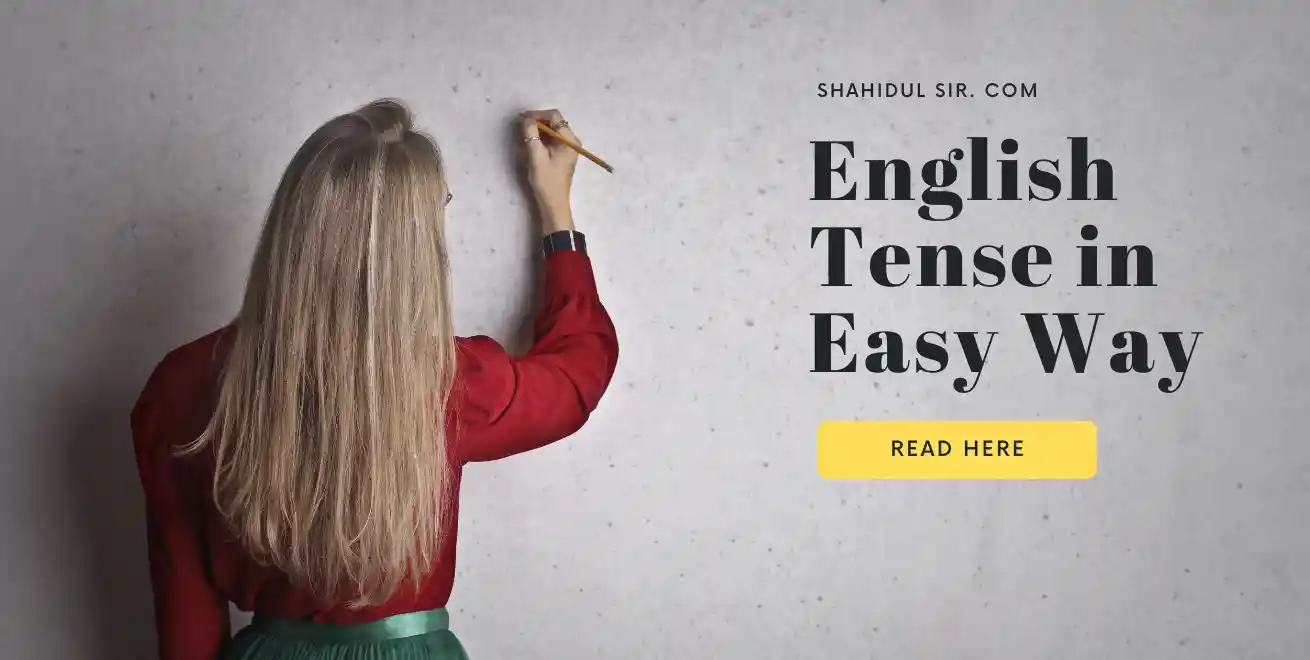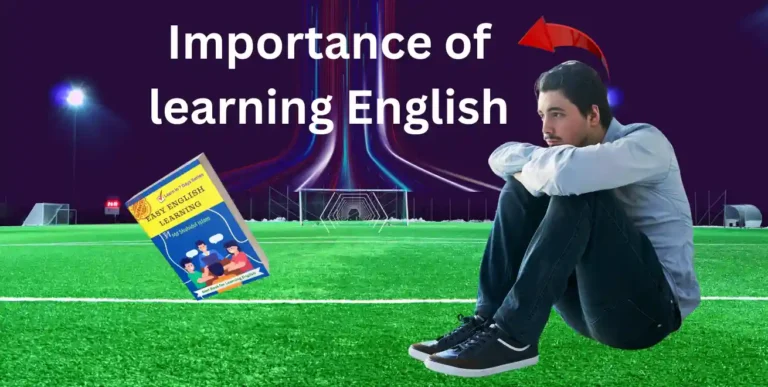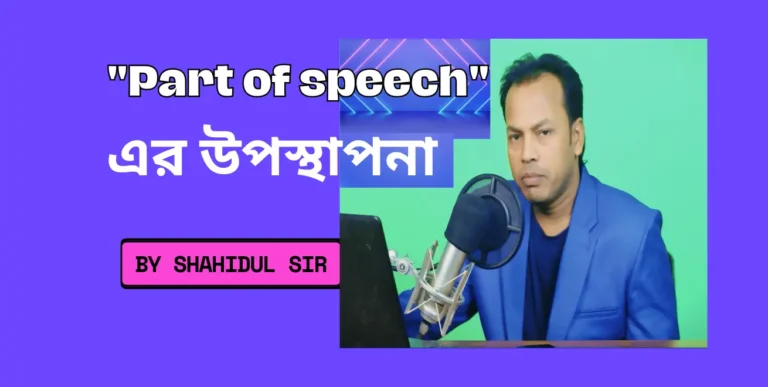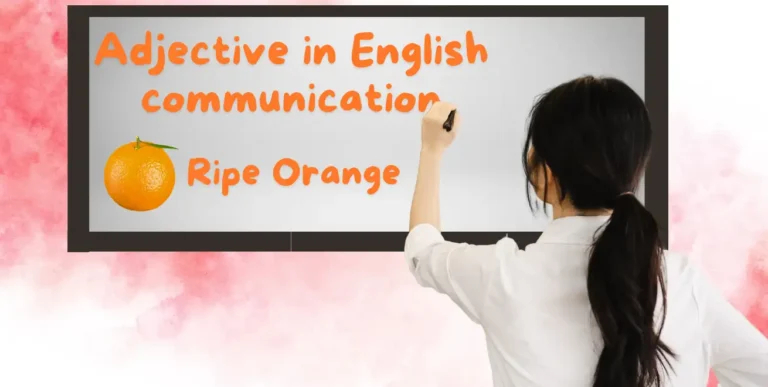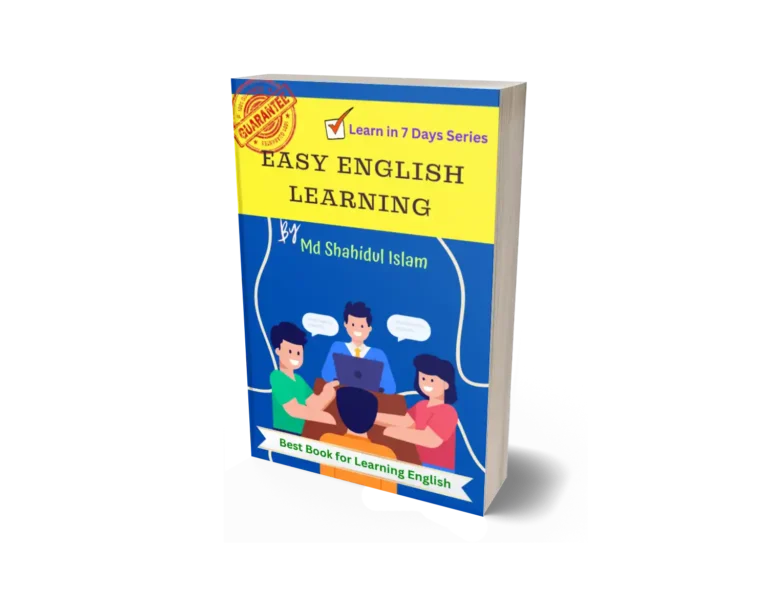ইংরেজি Tense বা কাল বোঝা: ব্যাকরণের মূলনীতি আয়ত্ত করা
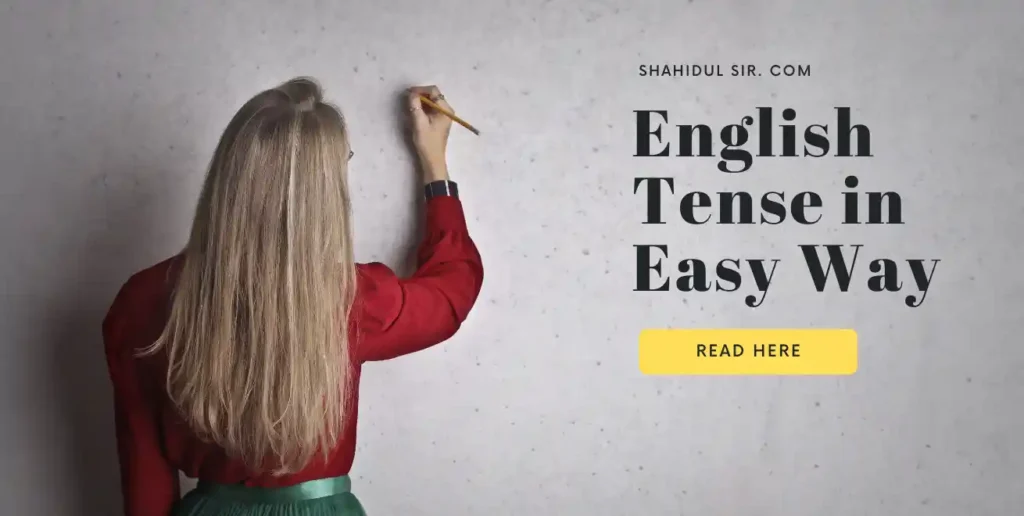
ইংরেজি একটি জটিল ভাষা হতে পারে, বিশেষ করে যখন Tense বা কাল বোঝার কথা আসে। যারা ইংরেজি ব্যাকরণ শেখার যাত্রা শুরু করছেন, তাদের জন্য Tense বা কাল আয়ত্ত করা একটি অপরিহার্য পদক্ষেপ যা কার্যকর যোগাযোগের ভিত্তি স্থাপন করে। এই ব্লগ পোস্টে, আমরা ইংরেজি Tense বা কালের জগতে গভীরভাবে ডুব দেব, তাদের সংজ্ঞা, শ্রেণীবিভাগ, কাঠামো নিয়ে আলোচনা করব এবং আপনার বোধগম্যতাকে আরও দৃঢ় করার জন্য উদাহরণ প্রদান করব। এই নিবন্ধের শেষে, আপনি আপনার লেখা এবং কথা বলার সময় আত্মবিশ্বাসের সাথে Tense বা কাল ব্যবহার করার ক্ষমতা অনুভব করবেন।
ইংরেজিতে Tense বা কাল বলতে কী বোঝায়?
Tense বা কাল বর্তমান মুহূর্তের সাথে সম্পর্কিত কোনও ক্রিয়া বা ঘটনার সময় নির্দেশ করে। এগুলি কোনও ক্রিয়া কখন ঘটে তা বোঝাতে সাহায্য করে—সেটি বর্তমানে ঘটছে, অতীতে ঘটেছে, অথবা ভবিষ্যতে ঘটবে কিনা। ইংরেজিতে, Tense বা কালগুলিকে তিনটি প্রধান প্রকারে শ্রেণীবদ্ধ করা হয়েছে: অতীত, বর্তমান এবং ভবিষ্যৎ। এই প্রতিটি শ্রেণীকে আরও সরল, ধারাবাহিক (বা প্রগতিশীল), নিখুঁত এবং নিখুঁত ধারাবাহিক রূপে ভাগ করা হয়েছে, যার ফলে বিভিন্ন ধরণের Tense বা কাল তৈরি হয় যা সময়ের বিভিন্ন দিক প্রকাশ করে।
Tense বা কাল আয়ত্ত করার গুরুত্ব
Tense বা কাল বোঝা বিভিন্ন কারণে অত্যন্ত গুরুত্বপূর্ণ:
যোগাযোগে স্পষ্টতা: সঠিক Tense বা কাল ব্যবহার নিশ্চিত করে যে আপনার শ্রোতারা কখন কোনও কাজ সংঘটিত হয়েছে তা বুঝতে পারে।
লেখার দক্ষতা বৃদ্ধি: Tense বা কালগুলির ভাল ধারণা আপনাকে আরও জটিল এবং সূক্ষ্ম বাক্য লিখতে সাহায্য করে।
কথন ক্ষমতা উন্নত করা: সঠিক Tense বা কাল ব্যবহার করে কথা বলা আপনার চিন্তাভাবনা সঠিকভাবে এবং আত্মবিশ্বাসের সাথে প্রকাশ করতে সাহায্য করে।
আমরা এগিয়ে যাওয়ার সাথে সাথে, আমরা প্রতিটি Tense বা কালকে বিস্তারিতভাবে অন্বেষণ করব, সংজ্ঞা, কাঠামো এবং উদাহরণ প্রদান করব।
Present Tenses
Simple Present Tense
সংজ্ঞা: সাধারণ বর্তমান কাল অভ্যাসগত ক্রিয়া, সাধারণ সত্য বা সত্তার অবস্থা বর্ণনা করে।
Structure:
- Affirmative: Subject + base form of the verb (add ‘s’ or ‘es’ for third person singular) + Object + Extension.
- Negative: Subject + do/does not + base form of the verb + Object + Extension.
- Interrogative: Do/Does + subject + base form of the verb + Object + Extension +?
Examples:
- Affirmative: She reads books every day.
- Negative: He does not like coffee.
- Interrogative: Do you play soccer?
Present Continuous Tense
সংজ্ঞা: বর্তমান চলমান কাল বর্তমানে ঘটছে বা চলমান ক্রিয়াগুলির জন্য ব্যবহৃত হয়।
Structure:
- Affirmative: Subject + am/is/are + verb+ing + Object + Extension.
- Negative: Subject + am/is/are not + verb+ing + Object + Extension.
- Interrogative: Am/Is/Are + subject + verb+ing + Object + Extension +?
Examples:
- Affirmative: They are studying for their exams.
- Negative: I am not watching television.
- Interrogative: Are you coming to the party?
Present Perfect Tense
সংজ্ঞা: বর্তমান ঘটমান কাল অতীতের ক্রিয়াগুলিকে বর্তমানের সাথে সংযুক্ত করে, প্রায়শই অভিজ্ঞতা বা পরিবর্তনগুলি নির্দেশ করে।
Structure:
- Affirmative: Subject + has/have + past participle + Object + Extension.
- Negative: Subject + has/have not + past participle + Object + Extension.
- Interrogative: Has/Have + subject + past participle + Object + Extension + ?
Examples:
- Affirmative: She has visited France twice.
- Negative: We have not finished our homework.
- Interrogative: Have you seen that movie?
Present Perfect Continuous Tense
সংজ্ঞা: বর্তমান ঘটমান চলমান কাল অতীতে শুরু হয়ে বর্তমান পর্যন্ত চলমান কোনও কর্মের সময়কালকে জোর দেয়।
Structure:
- Affirmative: Subject + has/have been + verb+ing + Object + Since / for + Extension.
- Negative: Subject + has/have not been + verb+ing + Object + Since / for + Extension.
- Interrogative: Has/Have + subject + been + verb+ing + Object + Since / for + Extension +?
Examples:
- Affirmative: He has been working here for five years.
- Negative: They have not been exercising regularly.
- Interrogative: Have you been studying for the test?
Past Tenses
Simple Past Tense
সংজ্ঞা: সাধারণ অতীত কাল অতীতে সম্পন্ন ক্রিয়াগুলিকে বর্ণনা করে।
Structure:
- Affirmative: Subject + past form of the verb + Object + Extension.
- Negative: Subject + did not + base form of the verb + Object + Extension.
- Interrogative: Did + subject + base form of the verb + Object + Extension +?
Examples:
- Affirmative: She visited her grandmother last week.
- Negative: He did not finish his assignment.
- Interrogative: Did you see the concert?
Past Continuous Tense
সংজ্ঞা: অতীতের একটি নির্দিষ্ট মুহূর্তে চলমান ক্রিয়াগুলির জন্য অতীত চলমান কাল ব্যবহৃত হয়।
Structure:
- Affirmative: Subject + was/were + verb+ing + Object + Extension.
- Negative: Subject + was/were not + verb+ing + Object + Extension.
- Interrogative: Was/Were + subject + verb+ing + Object + Extension + ?
Examples:
- Affirmative: They were playing soccer when it started to rain.
- Negative: I was not sleeping during the meeting.
- Interrogative: Were you studying at 8 PM last night?
Past Perfect Tense
সংজ্ঞা: অতীত ঘটমান কাল অতীতে অন্য কোনও কাজের আগে সম্পন্ন হওয়া ক্রিয়াগুলিকে বর্ণনা করে।
Structure:
- Affirmative: Subject + had + past participle + Object + Extension.
- Negative: Subject + had not + past participle + Object + Extension.
- Interrogative: Had + subject + past participle + Object + Extension + ?
Examples:
- Affirmative: She had already left when I arrived.
- Negative: We had not seen that movie before.
- Interrogative: Had you finished your project before the deadline?
Past Perfect Continuous Tense
সংজ্ঞা: অতীত ঘটমান চলমান কাল অতীতে অন্য কোনও ক্রিয়ার আগে চলমান একটি ক্রিয়ার সময়কালকে জোর দেয়।
Structure:
- Affirmative: Subject + had been + verb+ing + Object + Since / for + Extension.
- Negative: Subject + had not been + verb+ing + Object + Since / for + Extension.
- Interrogative: Had + subject + been + verb+ing + Object + Since / for + Extension + ?
Examples:
- Affirmative: They had been waiting for an hour before the bus arrived.
- Negative: I had not been studying before the test.
- Interrogative: Had you been working there long before you moved?
Future Tenses
Simple Future Tense
সংজ্ঞা: সাধারণ ভবিষ্যৎ কাল ভবিষ্যতে ঘটবে এমন ক্রিয়াগুলিকে বর্ণনা করে।
Structure:
- Affirmative: Subject + will + base form of the verb + Object + Extension.
- Negative: Subject + will not + base form of the verb + Object + Extension.
- Interrogative: Will + subject + base form of the verb + Object + Extension + ?
Examples:
- Affirmative: She will travel to Europe next year.
- Negative: He will not attend the meeting.
- Interrogative: Will you join us for dinner?
Future Continuous Tense
সংজ্ঞা: ভবিষ্যৎ চলমান কাল বলতে ভবিষ্যতে একটি নির্দিষ্ট সময়ে চলমান ক্রিয়াগুলিকে বোঝায়।
Structure:
- Affirmative: Subject + will be + verb+ing + Object + Extension.
- Negative: Subject + will not be + verb+ing + Object + Extension.
- Interrogative: Will + subject + be + verb+ing + Object + Extension + ?
Examples:
- Affirmative: They will be studying when you arrive.
- Negative: I will not be working tomorrow.
- Interrogative: Will you be attending the conference next week?
Future Perfect Tense
সংজ্ঞা: ভবিষ্যৎ ঘটমান কাল এমন ক্রিয়াগুলিকে বর্ণনা করে যা ভবিষ্যতে একটি নির্দিষ্ট সময়ের আগে সম্পন্ন হবে।
Structure:
- Affirmative: Subject + will have + past participle + Object + Extension.
- Negative: Subject + will not have + past participle + Object + Extension.
- Interrogative: Will + subject + have + past participle + Object + Extension + ?
Examples:
- Affirmative: She will have graduated by next June.
- Negative: We will not have finished the project by then.
- Interrogative: Will you have completed the report by Friday?
Future Perfect Continuous Tense
সংজ্ঞা: ভবিষ্যৎ ঘটমান চলমান কাল ভবিষ্যতের একটি নির্দিষ্ট বিন্দু পর্যন্ত চলমান একটি কর্মের সময়কালকে জোর দেয়।
Structure:
- Affirmative: Subject + will have been + verb+ing + Object + Since / for + Extension.
- Negative: Subject + will not have been + verb+ing + Object + Since / for + Extension.
- Interrogative: Will + subject + have been + verb+ing + Object + Since / for + Extension + ?
- Examples:
- Affirmative: They will have been living here for ten years by next month.
- Negative: I will not have been working there long by the time I leave.
- Interrogative: Will you have been studying for five hours by the time the exam starts?
উপসংহার
ব্যাকরণ দক্ষতা উন্নত করতে চাওয়া প্রত্যেকের জন্য ইংরেজি Tense বা কাল বোঝা এবং আয়ত্ত করা অপরিহার্য। Tense বা কালকে অতীত, বর্তমান এবং ভবিষ্যতের মধ্যে শ্রেণীবদ্ধ করে এবং তাদের বিভিন্ন রূপ অন্বেষণ করে, আমরা লেখা এবং বলার ক্ষেত্রে আমাদের যোগাযোগ ক্ষমতা বৃদ্ধি করতে পারি।
এই জ্ঞান কেবল ভাষা শিক্ষার্থীদের জন্যই নয়, ব্যক্তিগত, একাডেমিক বা পেশাদার উদ্দেশ্যে তাদের ইংরেজি দক্ষতা উন্নত করতে ইচ্ছুক যে কারো জন্যও অপরিহার্য। shahidulsir.com-এ, আপনি অতিরিক্ত সংস্থান পাবেন, যার মধ্যে রয়েছে আমার বই “Easy English Learning”, যা ব্যাকরণের বিষয়গুলির আরও গভীরে অনুসন্ধান করে, সেগুলিকে সহজেই বোধগম্য করে তোলে।
এখন যেহেতু আপনি ইংরেজিতে বিভিন্ন কাল সম্পর্কে অন্তর্দৃষ্টি অর্জন করেছেন, আমি আপনাকে আপনার দৈনন্দিন কথোপকথন এবং লেখায় সেগুলি ব্যবহার করার অনুশীলন করতে উৎসাহিত করছি। মনে রাখবেন, ব্যাকরণ আয়ত্ত করা একটি যাত্রা, এবং আপনার প্রতিটি পদক্ষেপ আপনাকে একজন আত্মবিশ্বাসী যোগাযোগকারী হওয়ার কাছাকাছি নিয়ে আসে। ব্যাকরণ সম্পর্কে আরও জানুন।
